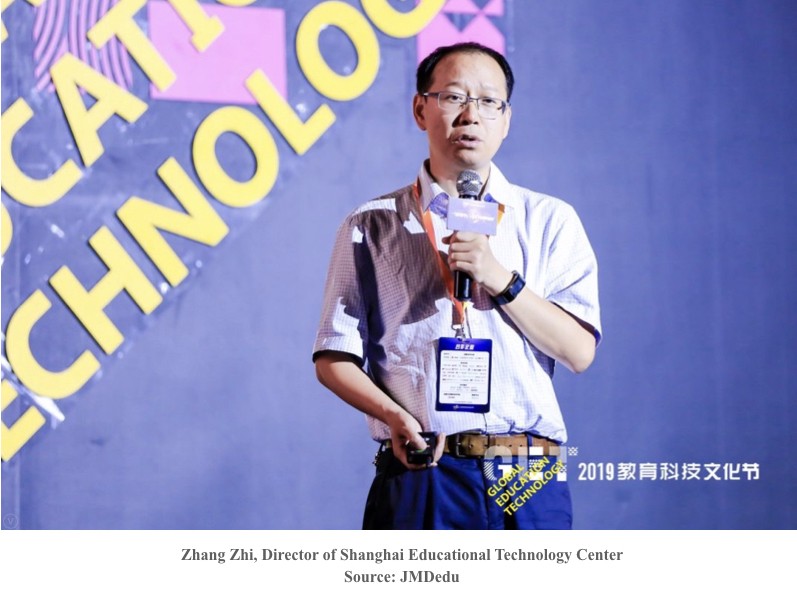Will traditional classroom become obsolete when schools ushering in 3.0 era?

On July 27th, we wrapped up the first Summer GET (Global Education Technology) Learning Festival in Shanghai under the theme of “Lifelong Learning” where Mr. Zhang Zhi, director of Shanghai Educational Technology Center addressed a keynote on “Schools ushering in 3.0 Era”, leading the audience to reflect on how traditional schools should be reformed from the perspective of education model transformation. In this piece, JMDedu put together Director Zhang’s talk to unveil Chinese scholars’ insights regarding schools’ revolutionary shift as well as his predictions of some future trends in this field to overseas readers.
Why schools have to change?
Zhang Zhi believes that today’s children are all “digital natives” which is referred to “a person born or brought up during the age of digital technology and so familiar with computers and the Internet from an early age”. In the current stage, educators are no longer able to completely keep education away from digital means because of the development of the internet. In China, education informatization 2.0 advocated by the government has spurred intelligent education as a new buzzword.
From computational intelligence to perceived intelligence and to integrated intelligence, the development of AI is iterating at an unimaginable speed. When society undergoes profound reforms, schools that carry the functions of teaching and educating must follow and take initiatives. “From the perspective of traditional education, people are regarded as machines so that teaching activities are just like the process of producing and remolding. If the approach and idea of education is not challenged, students will find it difficult adapting to the future workplace and thereby struggling to live a happier, more enjoyable and creative life,” agreed by Zhang Zhi.
AI’s impact on human society is irreversible that is expected to revolutionize humans’ lifestyle by 2050. Zhang Zhi believed: “it is expected that by 2050, there will be 10 billion robots coexisting with humans on the earth, and they will be more deeply involved in all aspects of humans’ life. By then, there will be a wide range of challenges our humankind has to confront including law and morality, classic theory, economic forms, social norms, and technological limits that are likely to experience breakthrough.” Lifestyle has been totally changed contributing to diverse learning approaches so we have to think, how can the teaching ways be transformed accordingly and what kinds of new features will the future school adopt?
How should schools change?
When we talk about the reform of school, we need to understand every historical stage of the school’s evolution. In his speech, Zhang Zhi has given a general introduction: “At the ancient time, education emerged even before human invented the first word. So education is not generated by the school and the role of teachers in this stage was often played by the elders. During the agrarian age, schools were physically established and then the industrial age entailed workers’ basic knowledge and skills for production so capitalists donated their money to the government, then the government started to run schools, which we called it compulsory education. Based upon this, philosophical thoughts from the industrial society could be reflected through the large-scale model and the standardization so that everyone has to attend standardized examinations. Moreover, the industrial society also emphasizes the process of the assembly line which may explain why the knowledge taught in each grade is completely fixed.”
The school of industrial society is called School 2.0 era that school education has come into a popularization stage by implementing the class-teaching model as a mainstream in order to prepare talents for industrial society. However, when deep diving into school education in China at the moment, it is still seen as large-scale, standardization and homogenization. Undoubtedly, when society develops toward post-industrial age, school evolution is very likely to lag behind. While ushering in 3.0 era, schools will be marked by individuation and innovation, embracing massive amounts of information. Campus boundaries are becoming more and more blurred, so is the role of teachers. Schools are no longer the necessities for students’ life, and traditional classroom is being disrupted by AI and other cross-border players.
Looking back in history, we have witnessed quite a few cases that education initiates were ahead of the times. For example, during the Renaissance, the liberation of thoughts has promoted the rapid prosperity of productivity. When asked about how to push today’s education ahead of our age, Mr. Zhang said that it was a bit difficult, “in traditional circumstances, education works as a think tank, which is always regarded as a symbol of conservatism. But when the digital revolution dawns, we have to make choices, the first being us initiating the school reform or we wait for the productivity to drive the development of education.”
The past five years, academia has been committed to leading the thinking pedagogy to pivot to digital pedagogy and data pedagogy. Scholars and experts are devoting themselves to applying education to practice with technology edges by reexamining the current educational theories, strategies, technologies, and resources and thereby arousing our further speculation upon a series of questions: “ In the current stage, are the contents school delivers good enough for students? Are textbooks suitable for students’ cognition and the video materials relevant to children’s moral education?”
What will schools in 3.0 era look like?
“Now, the role of teachers has shifted from the authority to facilitators, companions and supporters. The time-space of learning has become ubiquitous. The future of school 3.0 will empower every learner by data including teaching, interpreting, making the decision, management, and innovation, which is the trend of school evolution.” Zhang Zhi’s vision for School 3.0 includes 13 scenarios.
(1) Each student will have a digital profile in light of the continuous data collection of his or her learning activities since the first day he or she is enrolled and this digital profile will be constantly updated through the individual’s growth. (2) Every teacher will have an AI assistant. (3) Each subject is interwoven with a knowledge map.
(4) Each teaching task is likely to be outsourced. In the future, the workload of school principals will be significantly lightened, that is, they just need to evaluate and select the services providers. (5) Every school is a part of the overall virtual school similar to the concept of Cloud Classroom. In the future, almost all the physical schools will launch the campus’ digital mapping in the virtual school. (6) All the learning activities will be recorded. People used to read books and now “read the screen”. Screen reading not only refers to transform the text into pictures or stream media but also interpret and better serve each learner through the analysis of eye movements, expression changes, internet operating behaviors and results.
(7) Each learner’s learning tasks are personalized. Thanks to the advanced technology, every student will be assigned different homework according to their level of knowledge mastery which is difficult to achieve relying on traditional education. (8) The length of schooling for each student will be flexible. (9) Every legitimate approach to learning will be admitted. (10) Education will focus on collaboration and symbiosis. Future schools should be learning-centered communities and students will no longer see each other as competitors.
(11) Each family will form a unique educational unit. (12) Every piece of educational equipment tends to be intelligent. (13) Every school will embrace a hidden curriculum such as museums, sports games, and film festivals. Future schools must place great emphasis on the design of this so-called hidden curriculum.
In fact, some of these 13 scenarios have already existed and some still in the process. However, the upcoming revolution of school has raised a doubt: Do we still need to go to school for education? The answer given by Zhang Zhi is: “Yes.” He believes that “attending school is for communication, and exchanging ideas is for verification which can help us know ourselves. People cannot be taught but need to be guided to find the true self.”
And when it comes to the school 3.0 era, the discussion of the role that technology plays in education can not be avoided. Zhang Zhi pointed out: “Technology is adept at accelerating the construction of concepts, distributing learning resources, enhancing sensory stimulation, and gathering more learning feedback.” But Zhang also laid out some drawbacks that technology cannot replace emotion, experience, and communication, which should not be overlooked. “Education is a process of exchanging feelings of affection in the collision of two hearts. From this perspective, the education industry will always be flourishing. Although much work may be accomplished by the advanced technology, the jobs that entail teachers to devote their love will never be replaced.”
In this age, when the school is about to reform and various new learning ways are emerging, each group with different identities will be entitled to engage themselves in more diverse learning activities. In the past, Chinese women’s socioeconomic status was far worse than that of men, both in the eyes of Western countries and Chinese society itself. But nowadays, female workers’ force in China’s social productivity could not be underestimated any longer, which just echoes the female education story we unfolded last week. We remain pretty positive about the outlook of reimagining learning.











